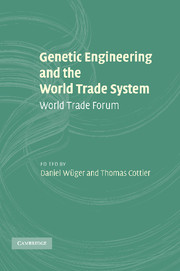Book contents
- Frontmatter
- Contents
- List of contributors
- List of abbreviations
- PART I Introduction and systemic issues
- PART II Intellectual property and gene technology: issues at stake and possible options
- PART III Food security, trade and agricultural production with genetically modified organisms
- PART IV Food safety, international trade and biotechnology
- PART V Medical research, cloning and international trade
- 12 Genetic engineering, free trade and human rights: global standards and local ethics
- 13 The regulation of human genetics by international soft law and international trade
- Index
13 - The regulation of human genetics by international soft law and international trade
Published online by Cambridge University Press: 06 October 2009
- Frontmatter
- Contents
- List of contributors
- List of abbreviations
- PART I Introduction and systemic issues
- PART II Intellectual property and gene technology: issues at stake and possible options
- PART III Food security, trade and agricultural production with genetically modified organisms
- PART IV Food safety, international trade and biotechnology
- PART V Medical research, cloning and international trade
- 12 Genetic engineering, free trade and human rights: global standards and local ethics
- 13 The regulation of human genetics by international soft law and international trade
- Index
Summary
Introduction
Recent years have seen a rapid increase in scientific and technological advances in the areas of molecular biology, genetics and bioengineering. Such scientific and biomedical developments have taken advantage of the fundamental freedoms protected by the human rights and other instruments, in particular, the freedom to engage in research and commerce. Because commercial genetic engineering and globalised trade are mutually supportive, a mechanism has been established by transnational corporations engaged in the biotechnology-pharmaceutical ‘life science’ industry, in partnership with supportive governments, to effectively open the market for systems for the production and supply of biomedicines throughout the developed countries, through the regime of the World Trade Organization (WTO).
This regime is based on the General Agreement on Trade in Services (GATS) and the Agreement on Trade-Related Aspects of Intellectual Property Rights (TRIPS Agreement) annexed to the Marrakesh Agreement Establishing the World Trade Organization, which entered into force on 1 January 1995. It is also important to note the effect of the Doha Declaration on the TRIPS Agreement and Public Health of 14 November 2001 and of other relevant soft law instruments adopted by the specialised agencies of the United Nations system, in particular the Food and Agriculture Organization of the United Nations (FAO) and the World Health Organization (WHO), without prejudice to the most important instrument of the United Nations in this field: the Convention on Biological Diversity of 5 June 1992.
- Type
- Chapter
- Information
- Genetic Engineering and the World Trade SystemWorld Trade Forum, pp. 315 - 342Publisher: Cambridge University PressPrint publication year: 2008
- 2
- Cited by

